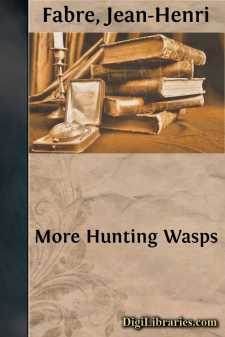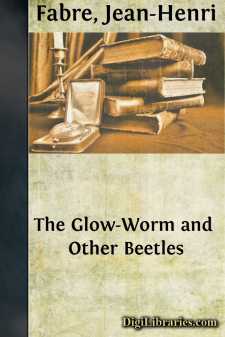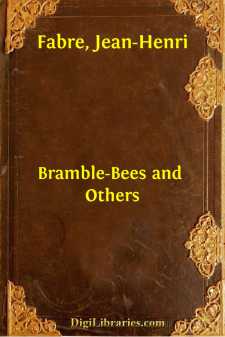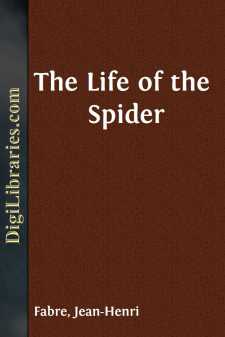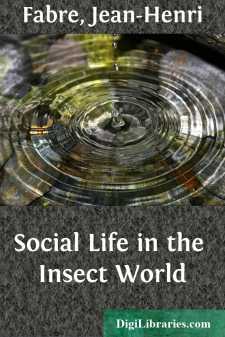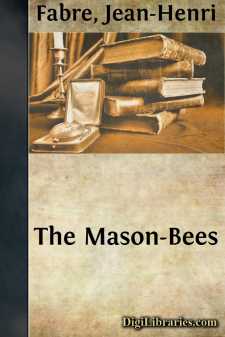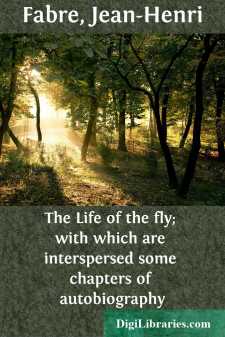Categories
- Antiques & Collectibles 13
- Architecture 36
- Art 48
- Bibles 22
- Biography & Autobiography 813
- Body, Mind & Spirit 141
- Business & Economics 28
- Children's Books 12
- Children's Fiction 9
- Computers 4
- Cooking 94
- Crafts & Hobbies 4
- Drama 346
- Education 46
- Family & Relationships 57
- Fiction 11826
- Games 19
- Gardening 17
- Health & Fitness 34
- History 1377
- House & Home 1
- Humor 147
- Juvenile Fiction 1873
- Juvenile Nonfiction 202
- Language Arts & Disciplines 88
- Law 16
- Literary Collections 686
- Literary Criticism 179
- Mathematics 13
- Medical 41
- Music 40
- Nature 179
- Non-Classifiable 1768
- Performing Arts 7
- Periodicals 1453
- Philosophy 64
- Photography 2
- Poetry 896
- Political Science 203
- Psychology 42
- Reference 154
- Religion 513
- Science 126
- Self-Help 83
- Social Science 81
- Sports & Recreation 34
- Study Aids 3
- Technology & Engineering 59
- Transportation 23
- Travel 463
- True Crime 29
More Hunting Wasps
by: Jean-Henri Fabre
Categories:
Description:
Excerpt
CHAPTER 1. THE POMPILI.
(This essay should be read in conjunction with that on the Black-bellied Tarantula. Cf. "The Life of the Spider," by J. Henri Fabre, translated by Alexander Teixeira de Mattos: chapter 1.—Translator's Note.)
The Ammophila's caterpillar (Cf. "The Hunting Wasps," by J. Henri Fabre, translated by Alexander Teixeira de Mattos: chapters 13 and 18 to 20; and Chapter 11 of the present volume.—Translator's Note.), the Bembex (Cf. idem: chapter 14.—Translator's Note.), Gad-fly, the Cerceris (Cf. idem: chapters 1 to 3.—Translator's Note.), Buprestis (A Beetle usually remarkable for her brilliant colouring. Cf. idem: chapter 1.—Translator's Note.) and Weevil, the Sphex (Cf. idem: chapter 4 to 10.—Translator's Note.), Locust, Cricket and Ephippiger (Cf. "The Life of the Grasshopper," by J. Henri Fabre, translated by Alexander Teixeira de Mattos: chapters 13 and 14.—Translator's Note.): all these inoffensive peaceable victims are like the silly Sheep of our slaughter-houses; they allow themselves to be operated upon by the paralyser, submitting stupidly, without offering much resistance. The mandibles gape, the legs kick and protest, the body wriggles and twists; and that is all. They have no weapons capable of contending with the assassin's dagger. I should like to see the huntress grappling with an imposing adversary, one as crafty as herself, an expert layer of ambushes and, like her, bearing a poisoned dirk. I should like to see the bandit armed with her stiletto confronted by another bandit equally familiar with the use of that weapon. Is such a duel possible? Yes, it is quite possible and even quite common. On the one hand we have the Pompili, the protagonists who are always victorious; on the other hand we have the Spiders, the protagonists who are always overthrown.
Who that has diverted himself, however little, with the study of insects does not know the Pompili? Against old walls, at the foot of the banks beside unfrequented footpaths, in the stubble after the harvest, in the tangles of dry grass, wherever the Spider spreads her nets, who has not seen them busily at work, now running hither and thither, at random, their wings raised and quivering above their backs, now moving from place to place in flights long or short? They are hunting for a quarry which might easily turn the tables and itself prey upon the trapper lying in wait for it.
The Pompili feed their larvae solely on Spiders; and the Spiders feed on any insect, commensurate with their size, that is caught in their nets. While the first possess a sting, the second have two poisoned fangs. Often their strength is equally matched; indeed the advantage is not seldom on the Spider's side. The Wasp has her ruses of war, her cunningly premeditated strokes: the Spider has her wiles and her set traps; the first has the advantage of great rapidity of movement, while the second is able to rely upon her perfidious web; the one has a sting which contrives to penetrate the exact point to cause paralysis, the other has fangs which bite the back of the neck and deal sudden death....


